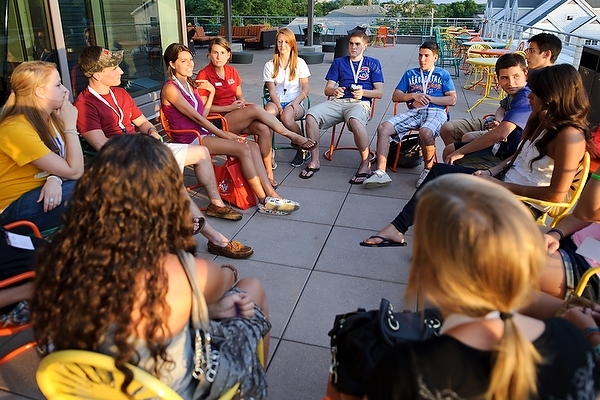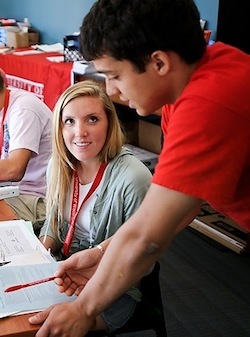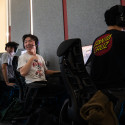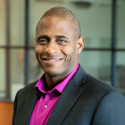Changes ease college transition for students, families

Major changes in the Student Orientation, Advising and Registration (SOAR) program encourage small and large group interaction to integrate new students into campus and connect with peers.
Photos: Jeff Miller
When Andy Haas Schneider brought her youngest daughter Abbey to the University of Wisconsin–Madison’s SOAR (Student Orientation, Advising and Registration) last year, the family expected the same old rush.
For the past 20 years, students beginning their UW–Madison experience have struggled to cram their first academic advising session into a single day, leaving little time for discussion. Haas Schneider knew the drill, having experienced SOAR with two older children in past years.
2012 was different.
“For the first time, I felt like we were invited and welcome to be partners in our child’s journey,” says Schneider. “We were informed (and continue to be informed via email — thank you, UW–Madison!) about what is going on and what is expected of our student. We really like being involved and engaged in this process.”
2013 marks the second year of SOAR’s new programming model, the first major overhaul in years. These changes resulted from more than two years of review and planning, as well as feedback from hundreds of staff, faculty and students.
The biggest shift allows students to experience academic advising and enrollment information on both days.

The biggest shift in SOAR allows students to experience academic advising and enrollment information on both days.
“This allows students to better absorb and process information, as well as consult with their families before enrolling on the second day,” says Carren Martin, director of UW–Madison’s Center for the First-Year Experience (CFYE), which coordinates much of SOAR. “The number of hours is the same, so it’s spread out a little more and feels less rushed in the process.”
For parents and families, the new model builds in opportunities to connect midway through the session, discussing enrollment choices and other concerns while advising is still in progress.
“It is my impression, from talking with parents and students at SOAR, that they found this new model to be more welcoming and less stressful,” says Wren Singer, director of undergraduate advising. “The chance to literally ‘sleep on it’ appeared to help students make decisions with less angst.”
Singer notes that advisors reported seeing few students make dramatic changes the next day. More students seemed confident with the decisions they had begun discussing on day one.
“At the end of an advising session I asked a student what her SOAR experience had been like,” says Singer. “She said, ‘I didn’t feel like a number, and I wasn’t stressed.’ That, in a nutshell, is what we were trying to accomplish.”
For parents and families, SOAR changed the tone of its programming, providing more intentional strategies and messages to appropriately support students during their college transition.
“It is my impression, from talking with parents and students at SOAR, that they found this new model to be more welcoming and less stressful.”
Wren Singer
“We wanted to be overt and explicit about how parents could use information from SOAR — about safety, and so on — to start conversations with their students,” says Martin.
The revamped two-day model also added technology and speakers to create an energized welcome. It encourages small and large group interaction to integrate new students into campus and connect with peers. Additionally, it strengthened partnerships with the First Wave Hip Hop and Urban Arts Learning Community and other campus cohorts to emphasis community and diversity.
According to post-SOAR surveys, 95 percent of first-year parents/guests, and 91 percent of transfer parents/guests, agree that SOAR helped them to think about conversations they could have with their student to enhance his or her success at UW–Madison.
“This was one of the biggest changes we noticed and appreciated,” says Haas Schneider. “I didn’t get the sense of urgency, perceived or actual, that was heaped upon Tommy, our oldest child.”
In 2013, Martin reports, things have already been running at the usual fast clip. By May 30, 6,500 new students had already signed up, with 7,000 parents and family members. The Office of Admissions and Recruitment projects that several hundred more may sign up throughout the summer.
No big program changes are planned in the near future — not in 2013, nor for the next few years. Still, Martin, Singer and their staff — including the passionate New Student Leaders — ontinue to make small adjustments each day to make sure things keep going smoothly.
“The program never looks exactly the same,” says Martin. “You change one thing and six other things change as a result.”
Tags: New students, parents, student resources



